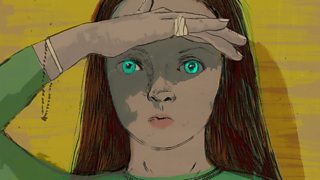What does obsession look like in the digital age?
Ever looked an ex up on social media and found yourself down an internet rabbit hole three hours later, still looking at pictures of their new partner?
In The Digital Human, Aleks Krotoski explores how obsessive behaviour can spiral out of control and hears from people whose watching of others became uncontrollable, compulsive and all consuming.
Does having a computer in our pocket and social media at our finger tips make obsessive behaviours easier? And how can we prevent ourselves getting lost down the rabbit hole?

-
![]()
The Digital Human: Obsession
Aleks Krotoski explores the thin line between passion and obsession online.
Retroactive jealousy
When Zachary Stockill was a teenager he fell in love. But he soon developed an unhealthy obsession with his girlfriend’s past. He had never been obsessed with anyone or anything, and he wasn’t a jealous person or worried about her cheating on him in the present, but a passing remark about a former partner flicked a switch in his brain. “That’s what sent me down the rabbit hole,” says Zach.
“In essence I just became fixated on little details about her past; I was very curious about what had happened in her romantic life before she met me.”
“I would also stalk her Facebook account… Where does this person fit in? And who’s in that picture? And what does this comment mean?”
Zach found himself caught in a loop cycle of curiosity about his partner’s past that was enormously difficult to escape. He tried to ease his retroactive jealousy by compulsively searching for answers online, but instead it just fed the beast.

Cyberstalking
The word cyberstalking was included in the Oxford English dictionary in 2010. It’s the digital form of the offline behaviour, taking place purely within the online world, and entirely facilitated by technology’s tools.
Recent research found that nine out of ten ex-partners will look at their ex’s Facebook profile, and about 70% of people admitted to looking at their ex’s profile through a mutual friend’s account.
Stina Sanders is a journalist who writes about her use of social media. Six years ago her partner left her without an explanation so she turned to obsessively watching his social media accounts to try and understand why. “I never really had closure as to why he left me, so my only source of closure was watching his new life with his new missus play out online,” says Stina.
It became an obsession, and even though they broke up years ago, she’ll still visit his Instagram, Facebook and Twitter pages: “I will quite often look at my ex-boyfriend’s social media to see what he’s up to, and I’ll also look at who they’re dating and see what she has that I don’t.”
This type of cyberstalking is more common than you might think. Recent research conducted in Canada found that nine out of ten ex-partners will look at their ex’s Facebook profile.
Cyberstalking is easier because you’re hidden from view
This Canadian research also revealed that about seventy percent of people admitted to looking at their ex’s profile through a mutual friend’s account. Even if they’d been defriended or blocked, they would still find a covert way to check up on them. Stina has created a fake profile so she can “have a really good stalk” of her ex-boyfriend and his new partner, “and they’ll never know.”
Emma Short, a Chartered Psychologist and Director of the National Centre for Cyberstalking Research at the University of Bedfordshire, explains how the online space allows us to become an obscured figure, watching everything else going by without being part of it. This removal impairs our judgment about boundaries. Being a people watcher isn’t a bad thing in itself, but social media allows us to watch people more: more than we should and more than we would admit to.
It’s now possible to continue obsessive behaviours uninterrupted in a way that in another setting might look obsessive. You can be looking at an ex’s profile a hundred times a day, but if you meet up with another friend, seem normal and your hair is clean, there’s no sign that anything is wrong. If you turn up outside an ex’s office and look through the window at them for eight hours, it’s a different story.
We have access to information we never had before
Social media provides a window into another person’s life and offers up a whole wealth of information that simply wasn’t available before.
The details we put online – when we’re checking into the cinema with this person, or “in a relationship” with that person – creates a goldmine of leads and possibilities. For someone with retroactive jealousy the temptation to jump into a partner’s past becomes too great.
And with break-ups in the past, we simply didn’t have the same opportunities to check on the other person. Now, it’s so easy. In her early twenties comedian Andrea Hubbert's partner ghosted her. She became convinced he was seeing someone new and following the break-up she began to obsessively stalk him online. She would go back and check his profiles, again and again. “When there’s nothing stopping you, you can be looking at somebody else’s Myspace like sixty, seventy times a day,” says Andrea.
The number of people on Tinder who are cheating

What proportion of the people you swipe on aren’t really genuinely available?
Perfect life pressure: why you need time away from social media

Simon Hoban has been finding out about the damage to our mental health and happiness.

Negative health effects
It doesn’t necessarily seem damaging to just look at something online, but “you’re chipping away at yourself,” says Andrea. Cyberstalking is “an extremely subtle form of self-harm.” She says it was very clear to her that the misery she felt after the break-up was being magnified by the social media behaviour. You’re seeking some sort of certainty to stop the hurt you’re feeling, but “you'll never find the answers you're looking for,” says the comedian.
Emma Short explains how obsessive online behaviours have a negative health effect for those doing them. You’re engaged in a repetitive behaviour that results in little to no reward: “You’re getting no positive reciprocal communication back. For social beings, that is not a good place to be.” Putting so much energy into something and getting nothing back “is not going to raise your self-esteem,” says Emma.
Why gardening on social media is not all it seems

There is a gulf between real gardens and those on social media.
What can we do if we think we have a problem?
One of the important things coming out of research done in this area is that when people feel like they’re losing too much time online researching others, or if they feel guilty about their behaviour, they must speak up. “Talk to your friends,” says Emma, or “there are things like professional help for people who feel like their lives have become so interrupted that they’re stuck.”
You’re engaged in a repetitive behaviour that results in little to no reward. You’re getting no positive reciprocal communication back. For social beings, that is not a good place to be.
Zach realised that the problem was entirely his own, and social media was making things “much, much worse… If I had any shot at recovery, I knew that I had to give these platforms up sooner rather than later.” He cut down his time online and was extremely disciplined about not “creeping” his partners past on social media. “You need to be strong enough to resist that temptation, because that temptation is not going anywhere,” he says.
For Andrea, she knew she had to do things differently going forward. With subsequent break-ups she deliberately cut off all contact online because she didn’t ever want rejection to make her behave obsessively again. Recognising it as a slippery slope, she has never looked at an ex’s social media profile since.
-
![]()
The Digital Human: Obsession
Aleks Krotoski explores the thin line between passion and obsession online.
-
![]()
Is there a spy in your pocket?
What can be done about the potential spyware in all of our pockets?
-
![]()
What does it take to be an eSports pro?
How much money are top players making, and what does the future hold for the industry?
-
![]()
Ways to watch what you reveal in your digital shadow
Every time you go online you reveal something about yourself.




